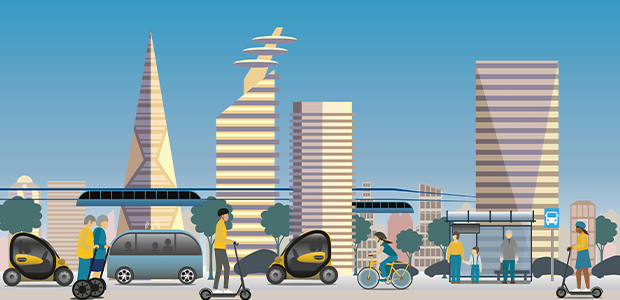
Top mobilitytech startups at MOVE UK 2024
With a dedicated Startup Village and a startup pitching stage, MOVE 2024 was the place to be as a mobilitytech startup. With innovations in every area of mobility, Startups Magazine has picked its top 10 mobilitytech startups that were at the show!
BrighterBikes
Engineered in the UK, the BrighterBike indicator promises an easy and quick installation. Whether day or night, its intense glow from hi-brite LEDs ensures cyclists remain visible on the road.
Given that many cycling accidents stem from poor visibility, the BrighterBike indicator addresses this issue head-on. It attaches to a bike and operates just like a car's turn signals, ensuring a cyclist's intentions are clear and unmistakable to other road users at all times.
Calyo
Calyo is pioneering the field of next-generation 3D ultrasound sensor technology for autonomous mobility. The company is dedicated to developing advanced sensing solutions that produce high-resolution, lidar-like point clouds. These sensors, known for their compact design and cost-effectiveness, are engineered to perform reliably in any weather condition. Calyo's technology finds applications across diverse sectors, including unmanned vehicles, healthcare, agriculture, and logistics. The company's mission is to improve the safety and efficiency of autonomous systems through its innovations.
Citipod
Citipod is set on transforming urban mobility with its sustainable transportation solutions. The company designs electric vehicles that are light, simple, and robust, aiming to replace traditional cars and vans in urban settings.
Citipod offers two primary models:
- CitiPod Cargo: Tailored for micro-deliveries such as fast food and groceries, this model boasts a payload capacity of 100kg and 550 litres. Designed for use on cycleways and roads, it requires no licence, insurance, or tax.
- CitiPod Passenger: Ideal for replacing short car journeys like school runs and shopping trips, this model provides 150 litres of luggage space. Usable by individuals as young as 14, it is perfect for navigating urban low/zero emission zones.
eBee Africa
eBee Africa, a pan-African e-mobility startup launched in late 2021, operates mainly in Kenya, Uganda, and Rwanda. The company is dedicated to developing and distributing electric bicycles tailored for urban commuting and last-mile delivery. eBee Africa’s mission encompasses promoting sustainable transportation, reducing CO2 emissions, and generating green jobs, especially for women and youth.
Their electric bicycles, including the eBX and Nyuki models, provide affordable and efficient alternatives to traditional motorbikes. These e-bikes are economical to run, featuring zero fuel costs and minimal maintenance requirements.
Kerbo Charge
Kerbo Charge is committed to ensuring EV charging is accessible for those without off-street parking. The company has innovated a patented through-pavement charging channel, enabling EV owners to safely and conveniently charge their vehicles at home. This system allows a charging cable to run from the house, through the pavement, and to the roadside, addressing the challenges urban EV owners face with public charging points, which are both costly and less convenient.
The charging channel is designed for easy installation, use, and maintenance. It features a self-closing lid to eliminate trip hazards and can adapt to the uneven surfaces of typical UK pavements. This solution is not only cost-effective for users but also advantageous for local councils facilitating the shift to sustainable transport options.
Motics
Motics is a startup dedicated to transforming mining operations into cleaner, safer, healthier, and more efficient environments by converting combustion engine vehicles to electric power. This conversion eradicates fumes, vibrations, and noise, tackling key causes of fire hazards in mines. Motics' technology delivers superior torque, enhanced energy efficiency, and zero emissions, markedly improving both environmental and operational conditions in the mining industry.
Nocomoto
Nocomoto is a startup introducing an innovative, ultra-low carbon vehicle that fills the gap between bicycles and cars. This vehicle combines the advantages of cycling with enhanced comfort, presenting an ideal option for urban commuting. Nocomoto’s design results in just 5% of the emissions and cost per mile compared to a typical car, offering an eco-friendly and economical solution for city travel. This pioneering approach aligns with the increasing demand for sustainable urban mobility options.
Revive Battery
Revive Battery, a startup established in 2022 and based in Amsterdam, Netherlands, focuses on revitalising lead-acid batteries. By extending their lifespan by two to three times and restoring up to 90% of their original capacity, Revive Battery offers a pioneering solution. This approach not only lessens the environmental footprint by reducing the demand for new batteries but also significantly decreases CO2 emissions linked to battery disposal and manufacturing.
Siren Aerospace
Siren Aerospace is at the forefront of electric vertical take-off and landing (eVTOL) aircraft innovation. Its flagship product, the Orca, is a lightweight, compact single-seater crafted for both urban and rural use. Featuring a hybrid power system that integrates lithium battery packs with optional hydrogen fuel cells, the Orca offers a flight time of up to two hours and a top speed of 65 mph.
Siren Aerospace is committed to tackling the traffic woes of megacities by delivering safe, quiet, and versatile personal aircraft. The startup's mission is to make flying accessible, effortless, and secure for everyone.
Vaeridion
Vaeridion is propelling the green aviation revolution forward with its swift certification and production of microliners, blending cutting-edge technology with engineering precision. Aiming for operational status by 2030, the startup seeks to address the increasing restrictions on conventional short-haul air travel in numerous countries. Vaeridion's aircraft are designed to enhance connectivity between regional airports and smaller airfields, offering a sustainable and efficient alternative to traditional short-haul flights.
The company's aircraft are planned to carry nine passengers over a distance of up to 500 kilometres. This innovative design incorporates batteries into the wings, optimising structural weight and boosting energy efficiency.

